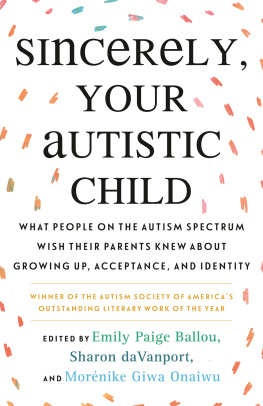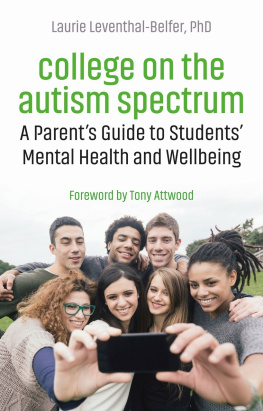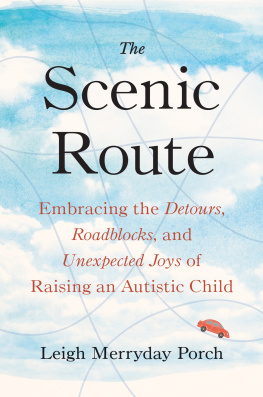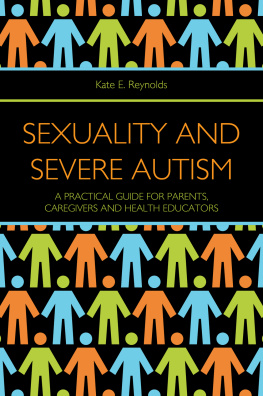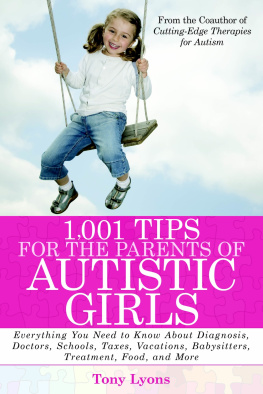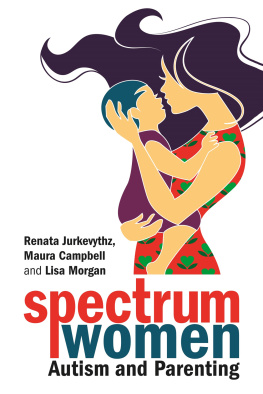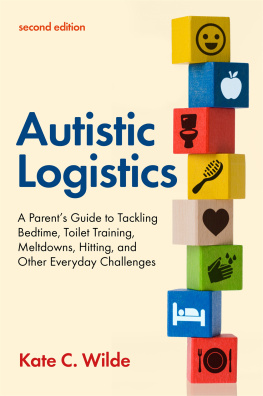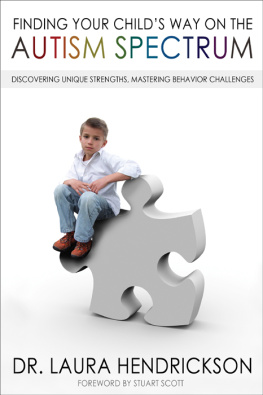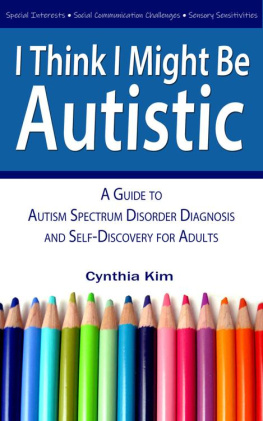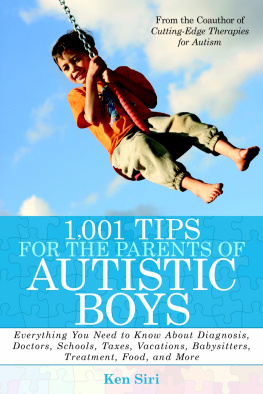Contents
Guide

This book is dedicated to
the autistic community of
our past, present, and future.
Those weve known and
those we havent; those who
have gone without recognition,
support, or acceptance;
those who are using their lives
to be the change we all need;
and for those to come who
will build a better future.
It is also dedicated to one of
the authors, Mel Baggs, who
died before this was published.
Mel will be missed for hir
openness, humor, and creativity
as much if not more than
for hir tireless advocacy for
the disability community.
Foreword
When parents come to me terrified, convinced there is no viable future for their precious children, I send them to those who not only wait to welcome our children with open arms, but who so willingly guide us as we make our way along this winding, rocky, beautiful path together.

A couple of years ago, I was asked to speak to a group of early education students at a local college. They were studying specialized teaching methodologies for Autistic students and, after bringing in an Autistic speaker, their professor wanted them to hear from a parent.
After I spoke, I opened the floor to questions. There was one I will never forget.
How did you feel, a student asked, when your daughter was first diagnosed with autism?
I took a deep breath and answered honestly. I was terrified, I said. I sobbed. I retched over a toilet bowl. Because of everything that I thought that I knew about autism, I could not imagine that there was any real hope of a future for her.
I took another deep breath before I continued.
Because, you see, I didnt know any better. I didnt yet know that the terrifying and damaging rhetoric out there about autism wasnt going to be our reality.
Desperate to find help for my newly diagnosed daughter, I turned to other parents, doctors, researchers, therapistsanyone who cared for or worked with Autistic individuals. While in some cases their experiences were helpful, the truth was that no matter how much or how hard theyd studied, how renowned their work or esteemed their opinions, they could still only offer the perspective I already hadthat of a neurotypical person making assumptions about the Autistic experience from the outside in.
Some of the so-called experts sold outrageous myths as truisms, backed by the long-outdated idea that in order to exist, a human trait must be expressed only in a way that is familiar and recognizable to neurotypicalsto wit: intelligence measured only by language-rich tests, the existence of empathy determined only by its method of delivery, theory of mind proven by a test so flawed that its not even wrong.
It soon became obvious that the current autism zeitgeist was off the mark. So I turned to the experts. The actual ones.
I searched for Autistic people who were able, in one way or another, to share their stories. As it turns out, they werent hard to find. In fact, they wereand areeverywhere.
Some of the folks I found were verbal, some were non-speaking. Some used electronic devices to communicate, some were able, after having spent years, as my friend Barb Rentenbach likes to say, disguised as poor thinkers to type their thoughts.
I yearned to hear everything they had to say. More than anything, I longed to understand my daughters experience not from the outside looking in but from the inside looking out.
It was on Brookes fifth birthday that I published a post called The Gift of Perspective.
I always feel so privileged, I wrote in response, to get glimpses into the minds and hearts of people who have lived through this. When someone says, I wouldnt change it for the world, well, what an amazing reminder that every bit of this struggle (both real and perceived) is SUBJECT TO PERCEPTION.
My daughter was five when I wrote those words. She had little to no novel language. Her life was often frustrating and overwhelming and painful and hard. It was a life-changing moment.
Over the years, I have become increasingly grateful to those who give so generously of their time and precious energy to share some of the most intimate details of their lives in the name of a better world for their younger brethren. I dont know what I would have done without their insight, their guidance, and their friendship. I cannot imagine the parent I would be today without having had their help in stripping away my own assumptions, my own ableism, and my deeply ingrained neurotypical bias in order to understand and respect my childs inner life.
Their experiences may not be an exact match with hers. Some may not even come close. But alwaysalwaysthere is invaluable insight to be gained from their writing: a glimpse of what it means to be Autistic in a predominantly neurotypical world.
There is no greater resource for neurotypical parents of Autistic children than the members of their own community. When parents come to me terrified, convinced there is no viable future for their precious children, this is where I send them: to those who not only wait to welcome our children with open arms, but who so willingly guide us as we make our way along this winding, rocky, beautiful path together.
They know, like no one else possibly can, of what they speak.
Jess Wilson
LETTER FROM THE EDITORS
When we first set out to publish What Every Autistic Girl WishesHer Parents Knew under our imprint, DragonBee Press, it was during a time in which there seemed to be a hopeless division between autistic adults and non-autistic parents. The relationship between autistic adults and parents of autistic kids has in the past been marked by misunderstanding and lack of a common language and sense of possibility for the lives of autistic kids. Since many of us had grown up in a time period in which autistic and intellectually/developmentally disabled youth were often segregated in school, institutionalized, and undiagnosed, or our disabilities treated with shame and hidden sometimes even from us, many parents of newly diagnosed young people had either never knownor never known that theyd knownother autistic people or what our lives could look like from early childhood all the way to later adulthood. As such, they didnt understand how to relate their own autistic kids to autistic adults (including strangers on the internet) asking them to parent differently.
But as a community of autistic people who were diagnosed or identified both early and later in life ourselves, who have found community and solidarity in each other, in many ways members of our organization, AWN, are uniquely equipped to reach out and let parents know that many of the most important sources of strength and support for building a good life were almost never a particular kind of therapy or clinical intervention. Instead, we draw strength from knowing that we are accepted by the people in our lives, the recognition of our full humanity, and chances to be genuinely included in the world around us.
With increasing recognition over the years of the historic under-diagnosis of certain segments of the community (such as autistic women and girls) came an increase in awareness that autistic people themselves could actually have children; many parents of autistic kids were actually autistic, but undiagnosed. In fact, several of our own authors are not just autistic people but are parents (biological and adoptive) of autistic children themselves, and their vital knowledge is shaped not only by their own autistic childhoods but by their experiences as parents.

